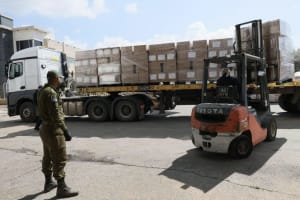Kibbutz Be’eri: From Farhud in Iraq to Oct 7 Hamas attack – a legacy of tragedy and resilience

In early June 1941, during the Jewish holiday of Shavuot – and roughly two months after a pro-Nazi coup in Baghdad, Iraq – a mob of Iraqi citizens waged a violent attack on Jewish homes, raping women and murdering Jews in several cities. The antisemitic pogrom that resulted in the deaths of approximately 180 Iraqi Jews later became known as the Farhud.
Accounts from survivors of the Farhud are horrific, including stories of extreme violence and brutality, even involving police and soldiers. Jewish residents had no means to defend themselves or escape the attacks, resulting in 180 deaths and hundreds injured, in addition to mass looting and the destruction of hundreds of Jewish homes and businesses.

The Farhud significantly accelerated the departure of Iraqi Jews, many of whom later immigrated to Israel with the help of Zionist activists, including residents of Kibbutz Be’eri, located in southern Israel near the Gaza border.
Kibbutz Be'eri was founded, in part, by those Iraqi immigrants who survived.
On Oct. 7, 2023, history seemed to repeat itself with a tragic and devastating attack against southern Israeli communities. On that morning, Kibbutz Be'eri was invaded and brutally attacked by Hamas terrorists. About 100 people on Be'eri were killed and 30 taken hostage. The attack on the kibbutz involved torture, murder, abductions into Gaza, and widespread destruction of property, with survivors witnessing homes being burned and families taken hostage.
Before and after Oct. 7, Kibbutz Be’eri stands as a testament to the resilience of the Farhud survivors.
Among the Iraqi immigrants who moved to Israel was Yaakov Tzemach, who joined a Zionist youth movement called HeChalutz and played a significant role in establishing Be'eri in 1946.
"We made aliyah from Iraq to Israel so that Arabs wouldn’t be able to enter Jewish homes and murder us," Tzemach explained.
Every Shavuot eve, Tzemach would recount the story of the Farhud to his family. He told them he survived the 1941 massacre because an older Muslim woman decided to intervene and physically block the rioters from entering the house.
Tzemach later joined the Israeli military where he served in the IDF’s Nahal agricultural settlement program, which sent a group to help strengthen Kibbutz Be’eri in the early 1950s. Today, the Nahal Brigade participates in various security missions, including combat operations and counter-terrorism efforts.

More than 70 years later, on Oct. 7 of last year, Tzemach’s son Doron recalled his father’s stories of the Farhud as he hid for hours from Hamas terrorists who invaded his home and attacked their community.
Sadly, Doron’s son, Shachar Tzemach, was part of the civilian emergency defense squad on Be'eri. He fought heroically for many hours before being killed.
The Tzemach family story, spanning three generations, illustrates the deep historical and emotional connections between the Farhud and the modern-day challenges faced by the residents of Be'eri.
There is a monument at Be'eri called the Farhud Memorial, which commemorates the 1941 massacre of Iraqi Jews. It serves as a poignant reminder of past atrocities and the Israel’s ongoing determination to fight against the enemy on all fronts. On Oct. 7, that same location was used by Hamas terrorists as a staging ground for their assault on the kibbutz.
The legacy of the Farhud and its impact Kibbutz Be'eri underscore the enduring struggle for Jews to have a homeland.
Joseph Samuels is another Farhud survivor. He is an active board member of JIMENA (Jews Indigenous to the Middle East and North Africa), an organization dedicated to preserving the culture and history of Mizrahi and Sephardic Jews. He currently resides in Santa Monica, California.
As reports, images and videos emerged on Oct. 7 – showing Hamas terrorists murdering entire Israeli families, raping women and killing young people at a music festival – for Samuels, it reignited trauma from the Farhud.
On June 1, 1941, Samuels’ older brother Eliyahu, unknowingly rode his bicycle to visit their cousins in the Old Jewish Quarter in Baghdad. He witnessed horrific violence, including a group of men stopping a minibus, dragging out the Jewish passengers, robbing and slaughtering them.
Fortunately, the Samuels family was spared when British forces entered Baghdad the following afternoon, but the trauma remained, especially because none of the perpetrators were convicted.
At the same time, Samuels recalled the courageous Muslim men who defended Jewish homes during the Farhud attack, risking their lives to protect their neighbors. Some took Jews into their homes and helped the injured. There were Muslim leaders who outwardly condemned the attacks, saying they were against the values of Islam.
This duality caused confusion for Samuels, whose father always praised his Muslim customers as honorable. His father would tell him, “Son, you must judge people by their individual actions, and not as a group.”
In those days, Samuels described the dilemma faced by Iraqi Jews: The potential for a second Holocaust if Arab armies won, or retribution from Iraqi leaders if they lost. After Israel's survival against Arab attacks in 1948, Iraq declared Zionism a capital offense, leading to accusations, arrests, and the execution of a prominent Jewish merchant, which instilled fear in the Jewish community.
Samuels was later accepted into three American universities but said he was denied an exit visa from the Iraqi government. With the help of Muslim smugglers, he managed to escape to Iran and finally to Israel, where he became a refugee.
Even though he was forced to stand in line for meals and sleep in a tent, he said felt liberated for the first time – he was no longer under the continuous persecution that forced 850,000 Jews in Arab countries to flee for their lives.
Reflecting on the differences and similarities between the experiences of Mizrahi Jewish refugees in Israel and Palestinians in Gaza, Samuels emphasized that oppression and exile need not lead to violence.
He condemned Hamas for its violent actions against Israel and its oppressive governance over the Palestinian population.
”As a Jew who survived the Farhud and who grew up with, and has, many faithful Muslim friends – and who knows the hardship of being a refugee – I cried for the massacre of Jews by Hamas,” Samuels said.
"I also cried for the innocent Palestinians who were killed by Hamas for refusing to follow orders and join their movement. I pray that the Palestinian people will find the courage to stand up to Hamas and make it a priority to establish a democratic and prosperous Palestinian state.”

The All Israel News Staff is a team of journalists in Israel.













